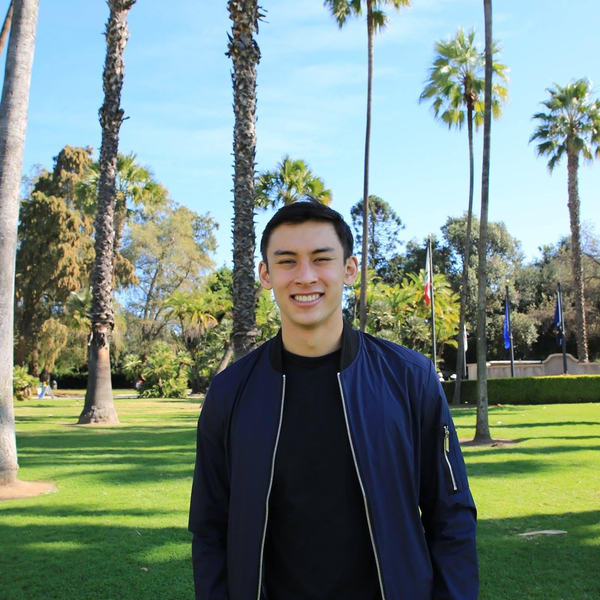
Major(s): Molecular Biology & Biochemistry
Minor(s): Chemistry, Informatics and Modeling
What is your current role? What was your journey in arriving there?
My current role is as a Junior Specialist in Dr. Hideho Okada, MD PhD’s lab in the Department of Neurological Surgery at UCSF. My lab focuses on the development of novel immune therapies, particularly chimeric antigen receptor (CAR)-T cells , for use against glioblastoma, diffuse intrinsic pontine glioma, and other high grade gliomas. As a junior specialist in the lab, I utilize a variety of in vivo scientific techniques, performing stereotactic surgery, focused ultrasound, two-photon microscopy, and bioluminescent imaging on live mice, and in vitro work, including preparation of tumor T cell, and mouse astrocyte cultures, flow cytometry, and immunofluorescence staining. I plan on working in this lab while applying for MD and MD/PhD programs.
I am a thyroid cancer survivor, which has motivated me to pursue cancer research focused on developing safer, more targeted therapeutic alternatives to radiation.
What do you enjoy about your work? What do you struggle with?
I enjoy getting to work with brilliant, engaging people and knowing that my work directly contributes to life-saving therapeutics. There is certainly never a boring day in the lab!
STEM Research, particularly academic biomedical research, is an extremely underfunded industry. While I am fortunate to work in a relatively well funded lab, this is certainly not the case across the entire industry. Many labs fail to get funding, or form connections in industry that are needed to outsource work. Additionally, there are many obstacles in pushing therapies from the laboratory into the clinic, with extensive, repeated testing and documentation required before FDA approval is granted.
How did your time at Wesleyan influence your career choice/journey?
At Wesleyan, I majored in Molecular Biology and Biochemistry, with minors in Chemistry and Informatics and Modeling. Pursuing this course of study equipped me with an ability to understand novel scientific literature in depth, and connect this information to design of new experiments and the current data I have gathered. Outside of the classroom, I was a varsity student athlete on the swimming and diving team, and was the academic committee chair of the Major Groove, Wesleyan’s chapter of the American Society for Biochemistry and Molecular Biology. Swimming definitely provided me with the motivation, resilience, and teamwork skills needed to succeed in research, while my time in the Major Groove helped me grow my leadership, teaching, networking, and interpersonal relation skills.
Do you have any advice for students thinking about entering your industry?
Scientific research is hard, and requires above all else an ability to tolerate and learn from failure. Wesleyan was amazing not only because of the classes I got to take and the lifelong friends that I made, but particularly because of the amazing mentorship relationships that I made with my professors. If you are interested in research, it is very important to not only find mentors who are not only interested in working with you, but are enthusiastic about fostering your growth and development while being respectful of your time and limitations.
Updated February 27, 2024

